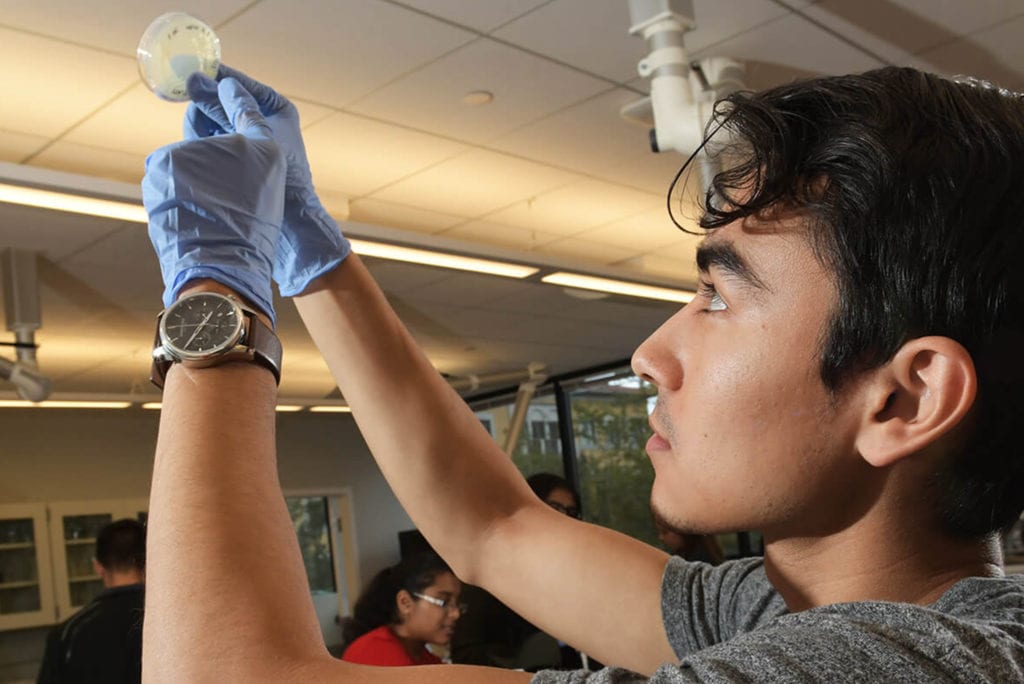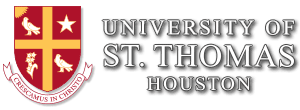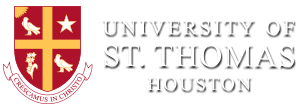Be Bold Blog
The University of St. Thomas (UST) is Houston’s Catholic University, committed to the Catholic intellectual tradition and the dialogue between faith and reason. Our blog is dedicated to helping you explore your future career possibilities and how to make the most of your college experience.
Pre-Med School Facts
6 Features the Best Pre-Med Schools in Texas Have in Common
To gain admission to medical school, you need to be an excellent student. On top of good grades, doctor of medicine (MD) and doctor of osteopathic medicine (DO) programs also look for candidates who are committed to hard work and have a true passion for medicine. Because the competition is so fierce, selecting a top-tier school for your undergraduate studies is critical.
But it can be difficult to identify the right college for you. Aside from knowing you want to attend a local school, you’re not sure what you should look for in a pre-med program. The good news is it’s less complicated to find great options than you might think.
As it turns out, there are certain features you’ll find at all the best pre-med schools in Texas. If you keep these criteria in mind when evaluating your choices, you’ll have a much easier time selecting a college.

6 Elements you’ll find at the best pre-med schools in Texas
There are certainly other elements you’ll want to look for as you get closer to determining which pre-med college is right for you, but make sure every school you’re considering meets the following criteria.
1. Health professions advisors who are dedicated to your success
It’s certainly possible to complete all medical school requirements [CS1] with the assistance of a general academic advisor, but it will likely prove more difficult. Those professionals typically have a limited knowledge of what it takes to put together a competitive application. As the Association of American Medical Colleges (AAMC) points out, pre-medical advisors can connect you to reputable resources, assist you in creating an application timeline and help you expand your professional network.
Those in Texas stand to benefit even more from having a deeply knowledgeable advisor, because most pre-med students apply to schools through both the American Medical College Application Service (AMCAS) and the Texas Medical and Dental Schools Application Service (TMDSAS). While the process is similar for both services, there are nuances that can be tricky to navigate on your own.
It’s also worth noting that advisors at the best pre-med schools recognize how challenging college can be for aspiring medical students. Researchers say these professionals can drive learners to persevere through difficult coursework by helping them maintain a sense of purpose and ensuring they understand why certain requirements are important.
2. Targeted medical school preparation services
Medical school is extremely challenging, so it’s not surprising that the application process requires a lot of hard work. There are many components that take a lot of time and effort. The best pre-med schools in Texas will have preparation services that can help you secure a competitive score on the Medical College Admission Test (MCAT), obtain strong letters of recommendation, write an excellent personal statement and make a lasting impression during interviews.
When it comes to the MCAT, taking mock exams is probably the most important way to prepare. Medical experts actually recommend taking a few practice exams, first to identify strengths and weaknesses and later to simulate the actual MCAT experience. While there are practice tests available online, good pre-med colleges will offer their own mock exam to help ensure their students get an experience that mimics test day as closely as possible.
Letters of recommendation and your personal statement are important, because they help medical school admissions committees gain a better understanding of who you are. It’s a good idea to look into whether a college you’re considering offers assistance with crafting your personal statement and supplemental essays, such as workshops. The best pre-med schools will also compile a Health Professions Advisory Committee (HPAC) letter for pre-med students rather than simply helping them identify individuals who might write recommendations. A committee letter is particularly useful for applications submitted through TMDSAS.
For most aspiring medical students, attending interviews is the final hurdle. Even the most confident pre-med can find these conversations nerve-wracking, so it’s a good idea to practice in a way that simulates the experience as closely as possible. Mock interviews are especially useful, and some colleges make these available to all pre-med students. The University of St. Thomas (UST), for instance, offers students the opportunity to participate in multiple mock interviews with physician alumni who provide feedback on performance immediately after the sessions.
3. A history of successful graduates
One of the most obvious ways to identify whether a particular pre-med college is a good option is to find out how successful pre-med students are upon graduating. Ask admissions staff what portion of graduates gain acceptance to a medical program. At UST, 95 percent of students who are offered an interview are accepted to medical school.
You can also ask about which MD and DO programs alumni attend, what specialties they go into and where the ultimately end up practicing. You can even ask whether it’s possible to get in touch with an alumni to learn more about their experience at the pre-med program you’re considering.
4. An education that incorporates numerous disciplines
Because there isn’t a designated pre-med major, future medical students have the option to obtain a degree in any field they choose. Today’s medical students have incredibly varied undergraduate backgrounds. The most recent data from the AAMC shows accepted students have bachelor’s degrees in the biological sciences, humanities, math, social sciences and more. The takeaway is you should study what interests you most.
It’s also worth considering that studying a variety of disciplines can help provide you with a well-rounded education, which can help ensure you’re making the right decision about pursuing medicine. Gaining exposure to a variety of subjects can also introduce you to viewpoints from a diverse array of students. Note that liberal arts schools are especially dedicated to ensuring students develop a broad base of knowledge.
5. Research opportunities
Participating in research is not required for medical school applications, but it can help you stand out. If you’re interested in getting involved in this type of experience, make sure the schools you’re considering have opportunities for undergraduates — this isn’t as common as you might think. Many institutions reserve the bulk of their research projects for graduate students, so be sure to ask admissions teams about whether gaining research experience as a pre-med student is even feasible.
6. Relationships with local hospitals and clinics
Medical students’ work and extracurricular endeavors are as varied as their choice of major, so you should get involved in the activities that interest you. But accumulating healthcare experience is nonnegotiable — every medical school expects applicants to devote a substantial amount of time to working alongside patients in a clinical setting. Why? Research shows that activities like physician shadowing ensure students understand what it’s like to be a doctor and the challenges they’ll face.
Shadowing is probably the most common type of healthcare activity, but pre-med students can also gain valuable experience as a medical scribe, patient care technician or intern. Finding opportunities can be difficult given how competitive the medical school applicant pool is. But attending a pre-med college that has connections with local physicians can be a huge help, particularly if it’s located in a metropolitan area. Houston, it’s worth noting, is home to the largest medical complex in the world, which means there are abundant opportunities.
Medical schools especially appreciate candidates with a breadth of experiences and continual involvement, so do your best to focus on consistency and quality rather than hitting a certain number of hours. And remember, these experiences can help you begin developing a robust professional network that will stick with you throughout your studies and your career.
Plan your pre-med path
It takes a lot of hard work to become a doctor, so it’s important to attend a college that can prepare you for the rigors of medical school. Keep the above criteria in mind as you compare options to help you home in on the best pre-med schools in Texas.
Once you have your short list, you can look into some more specific information to find the college that best meets your needs. For example, schools like UST provide countless professional development opportunities that allow you to connect with working physicians and likeminded students. Learn more about how you can prepare for life as a doctor by visiting UST’s Pre-Medical Track page.
[CS1]Add link to “Texas Medical School Requirements Aspiring MDs Should Consider” once published.
Ready to take the next step?
Related articles
About UST
The University of St. Thomas (UST) is Houston’s Catholic University, committed to the religious, ethical and intellectual traditions of Catholic higher education. For more than 70 years, we’ve been graduating students like you into successful careers in medicine, education, business, public administration and more – throughout Houston and across the globe.

